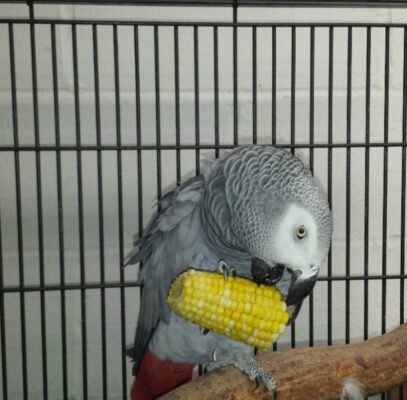Finding Your Perfect Companion: Parrots for Sale African Grey
parrots for sale African grey are renowned for their intelligence, charm, and captivating personalities, making them highly sought-after companions among bird enthusiasts worldwide. If you’re considering adding an African Grey Parrot to your family, this comprehensive guide will provide you with essential information on finding, selecting, and caring for one of these remarkable birds.
Understanding Parrots for sale African Grey:

What Makes parrots for sale African grey Special? African Grey Parrots possess several unique traits:
Exceptional Intelligence: Renowned for their intelligence, African Grey Parrots have cognitive abilities comparable to those of young children. They can learn extensive vocabulary and demonstrate problem-solving skills.
Sociable Nature: African Grey Parrots form strong bonds with their human companions and thrive on social interaction. They enjoy being part of the family and require mental stimulation.
Charming Personalities: Known for their charming personalities, African Grey Parrots exhibit traits such as curiosity, affection, and a playful demeanor, providing endless entertainment and companionship.
Finding Parrots for Sale African Grey:
Where to Find African Grey Parrots: When searching for African Grey Parrots for sale, consider various sources:
1. Avian Breeders: Reputable breeders specializing in African Grey Parrots are a reliable source. Research their reputation, visit their facilities, and inquire about the health and socialization of their birds.
2. Pet Stores: Some pet stores may offer African Grey Parrots for sale. Ensure the store prioritizes the welfare of their birds and provides proper care and housing.
3. Rescue Organizations: Adopting a rescue organization gives a second chance to birds in need. These organizations often have African Grey Parrots available for adoption, offering a compassionate choice.
4. Online Platforms: Websites and online marketplaces may list African Grey Parrots for sale. Exercise caution and research sellers to ensure they are reputable and ethical.
Selecting Your Parrots for sale African grey:
Considerations When Choosing a Parrot: Before purchasing an African Grey Parrot, consider the following factors:
Health and Temperament: Prioritize the health and temperament of the parrot. Look for birds that are alert, active, and exhibit bright eyes and glossy feathers.
Housing and Enclosure: Provide a spacious and enriching environment for your African Grey Parrot. Invest in a large cage with plenty of room for movement and include perches, toys, and enrichment activities.
Diet and Nutrition: Offer a balanced diet consisting of high-quality pellets, fresh fruits, vegetables, nuts, and seeds. Avoid feeding high-fat or sugary foods that can lead to obesity and health issues.
Veterinary Care: Schedule regular veterinary check-ups to monitor your parrot’s health and well-being. Find a veterinarian experienced in avian medicine and discuss preventive care measures.
Conclusion: Bringing an African Grey Parrot into your life can be a rewarding experience. By finding a reputable source, prioritizing the bird’s health and well-being, and providing proper care and attention, you’ll enjoy years of companionship and joy with your intelligent and charming feathered friend. With dedication and love, your African Grey Parrot will flourish as a cherished member of your family.
FAQ’s
What problems do African grey parrots have?
African Grey Parrots are generally hardy birds when provided with proper care, but like all pets, they can be susceptible to certain health issues and behavioral problems. Here are some common problems that African Grey Parrots may experience:
1. Feather Plucking:
- African Grey Parrots are prone to feather plucking, a behavior where they compulsively pull out their feathers. This can be caused by stress, boredom, illness, or environmental factors.
2. Respiratory Issues:
- African Grey Parrots are sensitive to airborne irritants such as smoke, aerosol sprays, and strong odors. Respiratory problems can arise if they are exposed to these irritants or if their environment is poorly ventilated.
3. Psittacosis (Parrot Fever):
- Psittacosis is a bacterial infection that can affect African Grey Parrots and other birds. It can cause respiratory symptoms, lethargy, weight loss, and other health issues. Proper hygiene and regular veterinary check-ups can help prevent and manage this disease.
4. Nutritional Deficiencies:
- African Grey Parrots require a balanced diet consisting of high-quality pellets, fresh fruits, vegetables, nuts, and seeds. A diet lacking in essential nutrients can lead to health problems such as vitamin deficiencies and metabolic disorders.
5. Beak and Nail Overgrowth:
- African Grey Parrots’ beaks and nails continuously grow and require regular trimming. If not properly maintained, overgrown beaks and nails can cause discomfort, difficulty eating, and even injury.
6. Obesity:
- African Grey Parrots are prone to obesity if they are fed a diet high in fatty foods or if they do not receive enough exercise. Obesity can lead to health issues such as heart disease, joint problems, and decreased lifespan.
7. Behavioral Problems:
- African Grey Parrots are intelligent and social birds that require mental stimulation and social interaction. Without proper enrichment and attention, they may develop behavioral problems such as aggression, vocalization issues, or excessive screaming.
8. Stress-Related Problems:
- African Grey Parrots are sensitive to changes in their environment and routine. Stressful events such as moving to a new home, changes in household dynamics, or lack of socialization can lead to health issues and behavioral problems.
It’s essential to provide a suitable environment, a balanced diet, regular veterinary care, and plenty of mental stimulation and socialization to ensure the health and well-being of African Grey Parrots. Additionally, monitoring for any signs of illness or behavioral changes and seeking prompt veterinary attention when needed can help prevent and address potential problems.

